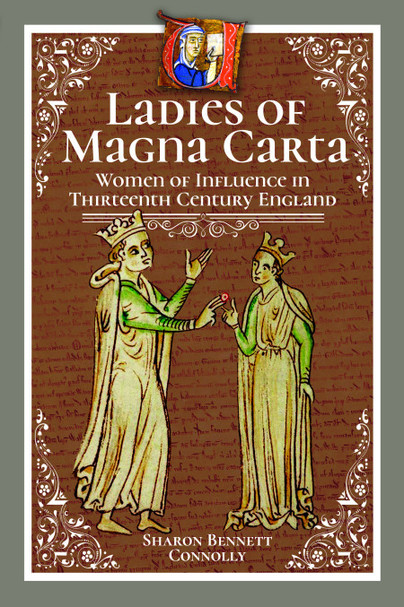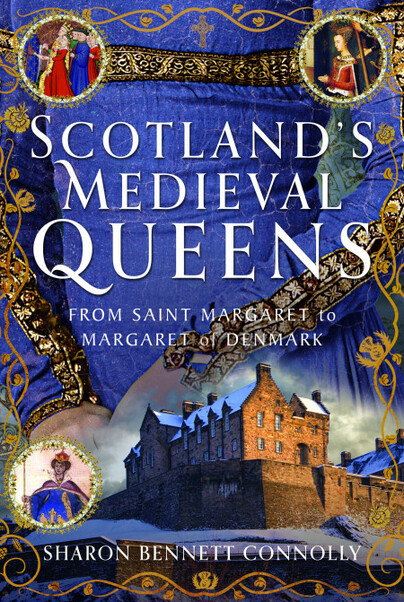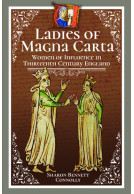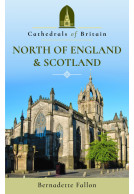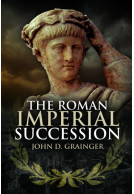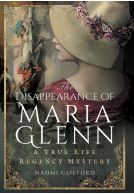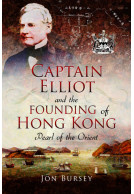Ladies of Magna Carta (Hardback)
Women of Influence in Thirteenth Century England
Imprint: Pen & Sword History
Pages: 280
Illustrations: 20 colour illustrations
ISBN: 9781526745255
Published: 29th May 2020
Last Released: 10th December 2020
(click here for international delivery rates)
Order within the next 1 hour, 56 minutes to get your order processed the next working day!
Need a currency converter? Check XE.com for live rates
| Other formats available | Price |
|---|---|
| Ladies of Magna Carta Paperback Add to Basket | £15.99 |
| Ladies of Magna Carta ePub (4.5 MB) Add to Basket | £6.99 |
Magna Carta clause 39: No man shall be taken, imprisoned, outlawed, banished or in any way destroyed, nor will we proceed against or prosecute him, except by the lawful judgement of his peers or by the law of the land.
This clause in Magna Carta was in response to the appalling imprisonment and starvation of Matilda de Braose, the wife of one of King John’s barons. Matilda was not the only woman who influenced, or was influenced by, the 1215 Charter of Liberties, now known as Magna Carta. Women from many of the great families of England were affected by the far-reaching legacy of Magna Carta, from their experiences in the civil war and as hostages, to calling on its use to protect their property and rights as widows. Ladies of Magna Carta looks into the relationships – through marriage and blood – of the various noble families and how they were affected by the Barons’ Wars, Magna Carta and its aftermath; the bonds that were formed and those that were broken.
Including the royal families of England and Scotland, the Marshals, the Warennes, the Braoses and more, Ladies of Magna Carta focuses on the roles played by the women of the great families whose influences and experiences have reached far beyond the thirteenth century.
Impressively detailed and researched, "Ladies of Magna Carta: Women of Influence in Thirteenth Century England" is an extraordinary and valued contribution to an often overlooked aspect of medieval 13th century English history. Enhanced with the inclusion of a section devoted to full color and thematically relevant photographs, an informative Epilogue (The Enduring Legacy of Magna Carta), three Appendices (The 1215 Magna Carta; Enforcers of Magna Carta - The Twenty-Five; The Charter of the Fore4st 1217); seventeen pages of Notes; an eleven page Bibliography, and a four page Index, "Ladies of Magna Carta: Women of Influence in Thirteenth Century England" is an inherently fascinating and exceptionally well written study that is unreservedly recommended for community, college, and university library Medieval English History and Women's History collections and a supplemental curriculum studies syllabus.
Midwest Book Review
Read the full review here
I thought the subject matter was fascinating; I live just a few miles from King John’s castle in Odiham, where it is said the king set out from when he went to Runnymede to sign the document. The author has done a remarkable job of piecing together the lives of so many women in this early medieval period when documentation about women was rare; in fact, often it was through their fathers, brothers and husbands that the author found details of many of these women during her research.
Rosie Amber
Read the full review here
Who's never heard about the Magna Carta or the Bad King John? They exist in our conscious memory but how much do we actually know about Magna Carta?
GoodReads, Constant Reader
In this book, Sharon Bennett Connolly explores the role of women behind the Magna Carta.
The clause 39 ("No man shall be taken, imprisoned, outlawed, banished or in any way destroyed, nor will we proceed against or prosecute him, except by the lawful judgment of his peers or by the law of the land") was promulgated in response to the imprisonment and starvation of Matilda de Braose, the wife of one of King John’s barons.
Matilda de Braose is just one of many fascinating women whose lives are described in this book.
Others include:
Nicholaa de la Haye who served as chatelaine of Lincoln castle and sheriff of Lincolnshire.
Isabella of Angoulême, the wife of King John, whose reputation was attacked by medieval chroniclers. Known as the "She-Wolf of France", she was only twelve when she married John.
Isabella, Countess of Norfolk, daughter of William, King of Scots (William the Lion), and his queen, Ermengarde de Beaumont.
Eleanor of Brittany, granddaughter of Eleanor of Aquitaine, whose brother Arthur was designated heir to the throne of England and its French territory by his uncle, Richard I, and murdered by King John.
This is a great book about strong females, some of whom carved out successful careers and whose names and deeds are still told and re-told today.
Read the full review here
I was interested in reading women’s roles throughout history as I haven’t fully explored it, and history has been male dominant.
For the Love of Books
It was interesting to read where women’s stories affected something as large as the Magna Carta. This book was good to read as I was able to learn about how women, even if they didn’t seemingly have any power, caused different parts of the Magna Carta to be created and how they affected the main people linked with the Magna Carta.
If you are interested in gaining a more in depth, rounded view of the magna carta and where women influence history, which is usually untold, I would definitely recommend reading this book.
This marvellous book provides much valuable insight into the roles of women of power at the time of the Norman Conquest. Superbly written, British history at its finest and most interesting.
Books Monthly
What Sharon Bennett Connolly does so effectively in all her books – but I think even more so in this one – is to create compelling narratives from the scraps of detail that are all that remain of these women. The focus of this book is the extent to which the fates of noble women were linked to the fortunes of the charter itself. Here we are presented with a tapestry of Angevin England where Sharon pulls on a thread and teases out a story to show us how the lives of noble women were inextricably woven into Norman politics and society.
Dodging Arrows… a History Writer's Blog
The Ladies of the Magna Carta gives us a sparkling new lens through which to view one of the most well-known events in English history.
Read the full review here
Author interview on Louise Wyatts Musings
Louise Wyatts Musings
Connolly’s meticulous research and her true passion for this time paired with her easy to understand writing style make this book an engaging and insightful read. I found this a delightful read. If you want a fantastic book that introduces you to the world of the Magna Carta and the women who directly affected by this charter, I highly recommend you read, “Ladies of Magna Carta: Women of Influence in Thirteenth Century England” by Sharon Bennett Connolly.
Adventures of a Tudor Nerd
Read the full review here
Ms Connolly is an accomplished writer of enormous strength. Her attention to detail and her particular interest in highlighting her character’s genealogy and where they sat in the intertwined threads of the nobility of the time, allows the reader an insight into their minds thus enabling a personal evaluation of how this influenced their actions, their views, and their feelings. What more can a lover of history ask for than to be entertained, enthralled and educated all in one go?
The Road to Hastings and other Stories
ALL I CAN SAY MORE IS THAT IF YOU DON’T READ THIS BOOK, YOU ARE MISSING OUT!
Read the full review here
Author guest post on The Writing Desk
The Writing Desk
Ladies of the Magna Carta is an exceptionally accomplished work, so readable and gripping, it was unputdownable, a great accolade for a work of Historical Non-Fiction... It’s a scholarly book, thoroughly researched, detailed, beautifully written, empathetic, and accessible. If you read no other nonfiction this summer, read this one. Highly recommended.
Carol McGrath Writer
Read the full review and author interview here
Author guest post on History Refreshed by Susan Higginbotham
History Refreshed by Susan Higginbotham
This book is another fascinating and eye-opening work and anyone with an interest in the subjects of Medieval Women, British History, or the legends of King John and the Magna Carta should be rushing out to get their copy.
S.J.A. Turney's Books & More
Read the full review here
Author guest post as part of blog tour
Samantha Wilcoxson
The book brings all these women, as well as their husbands and children to life, recounting their stories in short but concise chapters, and explaining their legacy, significance to the period and how some women like Eleanor de Montfort and Isabel D’Aubigny used the charter to fight for their rights and for political reform. Politically aware and legally savvy women were not the exceptions in Medieval England that we tend to think, and which is something which my own research has borne out.
The History Lady
A transcription of the Magna Carta and the 1217 Charter of the Forest makes this fascinating book into a valuable reference book as well.
Read the full review here
I very much enjoyed this book. It tells, as the title says, the story behind the Women of Magna Carta. Unfortunately this ‘women’s” history suffers for being told through the eyes of the men who fathered, loved and married these women, but that is just the nature of history in the ,Medieval period I’m afraid.
NetGalley, Rebecca B
The author does an admirable job with the evidence available and this is written in a lively, engaging style. A Great book for anyone interested in the period of Magna Carta.
Ladies of Magna Carta by Sharon Bennett Connolly explores both the effects women had on the events leading to the Magna Carta as well as how it affected medieval English women after it was signed. It was well-researched and written and I enjoyed looking at a pivotal event in English history through the eyes of the women around it.
NetGalley, Melisa Safchinsky
When one considers the Magna Carta, basically one pictures an evil king forced by the barons to sign a document. Interestingly enough, the basic rights of rich widows are also included. This book tells the tales of several royal women whose lives were impacted by this document. I found this book fascinating and very easy to read. Definitely Will be purchasing this book for my shelves.
NetGalley, Rebecca Haigh
This was a fascinating insight into the ladies and events that shaped the Magna Carta. It was well researched and detailed. It also taught me about some fascinating women of that era. It was a very easy and interesting read!
NetGalley, Lara Belošević
The book is a well-researched and thorough examination of the lives of the people who were affected, directly or indirectly, by this great charter. Everything is laid out clearly and logically and the author has an easy, conversational style which really helps the book to flow. There's so much information here - the appendices are great and there is an extensive bibliography - but it all sinks in effortlessly because of her natural writing style.
Reads, Writes, Reviews
A must-read for anyone interested in this pivotal moment in English and Scottish history.
Read the full review here
This book is highly recommended and the author is a very skilful as a historian.
13th Century History
Read the full review here
Rating: 5 out of 5 stars
NetGalley, Rebecca Hill
Magna Carta was a bitter pill for King John to swallow, but one that he refused and threw out again and again. It was the events that led up to the charter that led many to distrust and fear what the king might do.
Matilda de Braose was a wealthy woman, a member of one of the leading families in the land. As she fell onto the wrong side of the king, she was imprisoned along with other members of her family. King John starved her and her son to death, trying to force the capitulation of her husband.
When the bodies were found, there were marks on the son's face, from where his mother had tried to stay alive - by eating the flesh of her own son.
This was only one of the many horrors that happened under the reign of King John, but much of the women who influenced the Magna Carta are only known through their husbands and minor mentions. There are, however, many women who were influential in their own rights - and these stories are played out on the pages of this book. Learn about a female sheriff, military maneuvers, and more!
Well done and fabulously written, if you enjoy history - then this is a must to add to your list! This book does not disappoint.
Connolly’s book is an informative and delightful read about women aspiring to control their destiny against this backdrop, but their success or failure had less to do with Magna Carta than with the timeless principles of resourcefulness, determination and knowing how to skilfully handle the big guy. It’s these qualities that make their stories inspiring.
Henry, Simon and the two Eleanors
Read the full review here
Sharon Bennett Connolly is a historian who I admire, and I was not disappointed by this book in the least. Magna Carta is a massive topic to take on, especially when battling the myths and misinterpretations of it that have held on over the centuries. First of all, it was not this beautiful document that liberated anyone and set the foundation for democracy. The barons wanted more power. That's it. And Magna Carta was practically torn up by John before his signature was even dry, so there's that too.
NetGalley, Sarah Mueller
Yet, there are still so many aspects of the document, the people, and the period to explore, and Connolly has done so masterfully in this new text relating directly to how it impacted several women who live through the tumult that was the medieval period.
A fair warning first - Magna Carta is complex. The period as it relates to Magna Carta is complex. This is not just a light reading that one might pick up and speed through in a few hours. I don't say this to discourage anyone, because it is well worth reading. I just want people to know what to expect.
If you have an interested in Medieval England and the Plantagenets, then you likely know the story of Matilda de Braose. She and one of her young sons were held captive by John and starved to death. Upon discovery of the bodies, there was evidence that Matilda had eaten parts of her son's face in a desperate attempt to survive. Because of this horrific event, Magna Carta contained the following clause (number 39):
"No man shall be taken, imprisoned, outlawed, banished or in any way destroyed, no will we proceed against or prosecute him, except by the lawful judgment of his peers or by the law of the land"
To say that John pissed some people off might well be the understatement of the millenniums.
Yet, as Connolly skillfully shows us throughout the entire text, Matilda de Braose is not the only woman to have impacted this document, or been impacted by it. Women from all over the entirety of the kingdom, from only the wealthy families of course, were to be touched by Magna Carta in one way or another. Women used the charter to protect themselves just as any man would have done in the same period, and many were successful in doing so.
Aside from an in-depth look at the de Braose family, Connolly has meticulously scoured historical records and come away with a wealth of information not only relating to the royal families of England and Scotland, but also the Marshals (my favorites!), the Warennes (she's also working on a new book about this family), the de la Hayes (definitely bad-asses), and so many others.
Women in history is a complex topic. The major problem is that up until recently, women were not considered worth writing about and so much information has been lost. There will be so much we can never know - even about some of history's most famous women, like my girl Eleanor of Aquitaine for example. She was held prisoner by Henry for FIFTEEN years and we have hardly any scraps of information about that time. We know where she was at times based on the Pipe Rolls, but not nearly as much as I wish for.
The book opens with an introduction into who John was and how Magna Carta came to even exist. We are given much background on him, which will be useful for those who are not familiar with my favorite dysfunctional family. Connolly also writes of Eleanor of Aquitaine, as well as the situations involving John and both of his wives. Even in a book titled 'Ladies of Magna Carta', it is crucial to explain John, because he is entirely why the barons felt this document even needed to exist. One must also remember as I mentioned earlier, women were not written about in their own right at that time. Anything recorded about them was usually in some way connected to how they related to the men in their lives, whether that be their fathers, brothers, husbands, and/or sons. This is an unfortunate side effect of women's rights and feminism not existing 800 years ago, but unfortunately there is nothing we can do really do about that now, is there? To understand how and why these women were able to accomplish what they did in that period, we have to know about the men in their lives. In my opinion, this does not take away from the incredible feats they were able to achieve. It makes them all the more remarkable. Readers must have context to understand what made these women so successful, and that context involves the men as well.
Overall I found this book to be a well-organized and deeply researched endeavor. Connolly has clearly spent much time and effort into providing readers as clear a picture as possible of some truly remarkable women. She brings the women to life and restores them to their rightful place in history.
Highly recommended.
If you're interested in Medieval history, particularly the history of the roles of women, this book will give you a greater understanding not only some of the strong, independent women who lived under John and the early years of Henry III, but how the Magna Carta changed many of their lives. And, as in the case of tragic Matilda de Braose, how some of them may have even altered the course of history.
Love British History
Read the full review here
Rating: 5 out of 5 stars
NetGalley, Jo Romero
Absolutely loved this book. It brought out the roles of women in the formation and assertion of the Magna Carta, something we don't hear very much about in general. There were some formidable women mentioned and I learned so much about their struggles and stories - some of them very tragic - and whether or not John was able to implement the Magna Carta to help them. In some cases, it was argued, women helped form the structure of some of the Magna Carta. A great read!
“Ladies of Magna Carta” was an interesting look into the lives of several of the leading women of the thirteenth century and how their experiences shaped aspects of one of England’s most famous and influential documents. Although we think of medieval women as having little to no role in politics or public life, Sharon Bennett Connolly proves us wrong by introducing us to women like Nicholaa de la Hay who was not only a sheriff in her own right, but held off invaders from her castle three different times... a well researched book with interesting views into the lives of several fascinating women.
NetGalley, Anne Morgan
This book is very detailed and well researched - those with an interest in this period will find it to their liking and a useful resource for their own investigations.
NetGalley, Melisende d'Outremer
The history of women isn't written about enough. I requested this one because it sounded like it would be a very interesting read about contemporary women. It focuses, of course, more on women who were royal or connected with the nobility, but it was still fascinating. Each chapter goes over different families or women. It was very easy to read and get into. When this gets published, I'm going to see if I can snag a copy because I'd want to own and reread this one!
NetGalley, Caidyn Young
A really interesting read. Well written and researched, full of facts I did not know. I recommend for all medieval history readers.
NetGalley, Shelly Myers
Fascinating book! It was interesting to read about women living at the time of the insuing of the Magna Carta and to learn about what chapters were addressed to them and in what respects.
NetGalley, Christine Boos
True, not much is known about the biographies of those medieval women. What is well known about them is their value on the marriage market meant to further their husbands' and their own families' own worth and not their own. They were pawns to dispose of as pleased their families. That was their own and true influence on the men who governed them!!! Only as widows they could theoretically decide on whether they wanted to marry or not according to the Magna Carta.
Much on the book is about the families of women, that is to say the male part. I found nevertheless interesting to read about differences in those various families in their relationship with their daughters and wives. A few of these medieval women did have a louder voice than was usually expected: 2 became Sheriffs, for instance.
A well-researched and comprehensive study of the women who lived through, and were affected by, the Barons' Revolt and the sealing of the Magna Carta. Ms Bennett Connolly has skilfully brought to the fore the lives of the women who have hitherto been hidden in the background. A must-read for anyone interested in this pivotal moment in English and Scottish history.
Annie Whitehead, author of Women of Power in Anglo-Saxon England, April 2020
Connolly’s book is an informative and delightful read about women aspiring to control their destiny against this backdrop, but their success or failure had less to do with Magna Carta than with the timeless principles of resourcefulness, determination and knowing how to skilfully handle the big guy. It’s these qualities that make their stories inspiring.
Darren Baker, author of The Two Eleanors of Henry III, April 2020
Rating: 5 out of 5 stars
NetGalley, Janett Recore
Absolutely amazing book! Could not stop reading it. Very informative and interesting. The author has an amazing ability to ferret out information on people we have always thought of as "lost". This is the third book I have read from this author and again I am blown away with her ability to make a very confusing time in English history interesting and, even more importantly, tell it from the perspective of a set of people often forgot about...women.
This was interesting indeed. I know about the Kings of the times of the Magna Carta but the ladies and Queens are a bit of a mystery to me. Very informative though.
NetGalley, Makenzie Erickson
About Sharon Bennett Connolly
Sharon Bennett Connolly, has been fascinated by history her whole life. She has studied history academically and just for fun – and even worked as a tour guide at historical sites, including Conisbrough Castle. For Christmas 2014, her husband gave her a blog as a gift – www.historytheinterestingbits.com – and Sharon started researching and writing about the stories that have always fascinated. Ladies of Magna Carta is her third non-fiction book. Her first book, Heroines of the Medieval World, was published in September 2017 and the second, Silk and the Sword: The Women of the Norman Conquest, was released in 2018. Sharon gives talks on women's history and her TV work includes Australian television's Who Do You Think You Are?
King John signs Magna Carta
15th June 1215
King John signs Magna Carta at Runnymede, near Windsor, England
Scotland’s Medieval Queens From Saint Margaret to Margaret of Denmark (Hardback)
Scotland’s history is dramatic, violent and bloody. Being England’s northern neighbour has never been easy. Scotland’s queens have had to deal with war, murder, imprisonment, political rivalries and open betrayal. They have loved and lost, raised kings and queens, ruled and died for Scotland. From St Margaret, who became one of the patron saints of Scotland, to Elizabeth de Burgh and the dramatic story of the Scottish Wars of Independence, to the love story and tragedy of Joan Beaufort, to Margaret of Denmark and the dawn of the Renaissance, Scotland’s Medieval Queens have seen it all.…
By Sharon Bennett ConnollyClick here to buy both titles for £48.99







